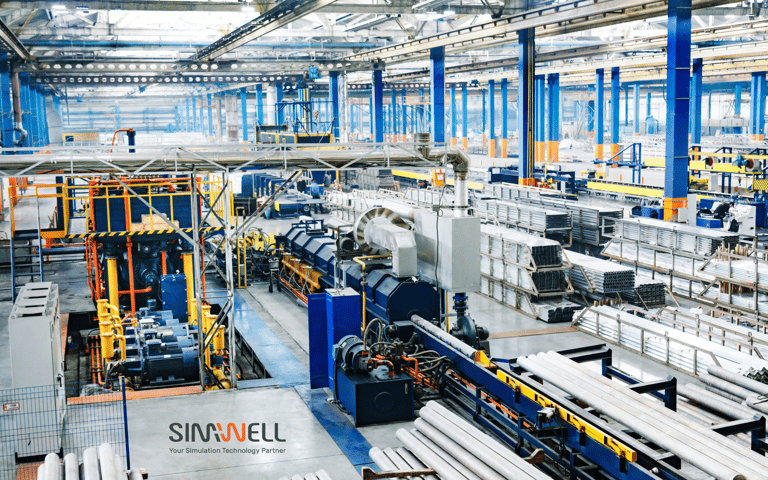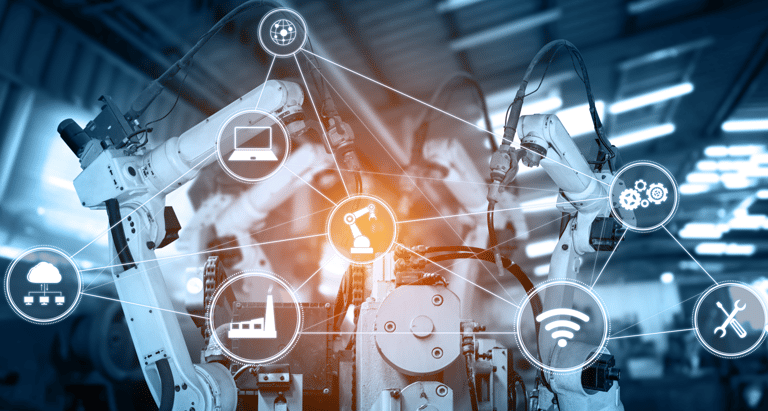Integrating Simulation, Optimization, and AI, Into Your Digital Twin To Solve Manufacturing Problems
Simulation and Digital Twin technology are revolutionizing manufacturing. By leveraging these tools, manufacturers can optimize processes, predict outcomes, and enhance productivity. In this blog post we share a few ways that advanced analytics plays a pivotal role manufacturing from optimizing material handling, improving production planning, and transforming copper mining operations.

AI Revolutionizes Material Flow in Steel Manufacturing
The steel industry is experiencing a significant transformation with the integration of AI and machine learning. These technologies are optimizing material handling, especially in the operations of crane systems. By using simulation to train AI through reinforcement learning (RL), manufacturers can improve efficiency and coordination without real-world risks.
This AI-driven approach surpasses traditional methods by handling complex variables and adapting to changing conditions. By integrating AI, steel manufacturers can enhance productivity, reduce operational costs, and advance industrial safety, marking a significant step forward in technological innovation.
Read More
Boosting Copper Production Operations with Digital Twins
Digital Twins are game-changers in copper production, particularly in optimizing hydrometallurgical processes like leaching and electrowinning. By creating virtual replicas of physical plants, manufacturers can conduct precise predictive modeling, scenario analysis, and training in a risk-free environment.
This technology addresses challenges such as process variability, energy consumption, and resource management. Ultimately, it enhances efficiency and profitability. Digital Twins enable operators to make informed decisions, ensuring copper plants operate at peak performance, driving sustainability and cost-effectiveness in the industry.
Read More
Digital Twins: Enhancing Maintenance and Operational Efficiency
In the realm of manufacturing, Digital Twin technology bridges the gap between the physical and digital worlds. This convergence enhances operational efficiency, reduces risks, and optimizes maintenance activities.
By embracing Digital Twins, businesses can make data-driven decisions with improved accuracy and efficiency, positioning their operations for sustainable growth.
Read More
What’s the Value of a Simulation-Based Digital Twin in Manufacturing?
Simulation-Based Digital Twins offer a significant competitive edge in manufacturing. These virtual models replicate physical processes, allowing for in-depth analysis and optimization without disrupting actual operations. By simulating different scenarios, manufacturers can identify potential bottlenecks, optimize resource allocation, and improve production efficiency.
This predictive capability leads to cost savings, enhanced product quality, and reduced downtime. Ready to elevate your manufacturing processes? Explore our simulation and digital twin services today.
Contact us to learn how we can help you optimize operations, reduce costs, and enhance efficiency.
Join leaders across industries who trust SimWell to revolutionize their operations. Let’s build the future of manufacturing together.
About SimWell
SimWell Consulting and Technologies is a global company specializing simulation, optimization, and digital twin technology. Our core mission is to unlock simulation at scale. We empower leaders and operators to maximize their current resources, optimize their operations, and elevate their performance with simulation. We build models of our customers operation, test scenarios, and predict how it will perform in a risk-free environment.
With SimWell as your partner, your team will have the tools to make confident decisions, optimize your process, and press fast forward on your business.
Written by:
Jon Santavy, CRO and Partner at SimWell
OR send me a note at @simwell.io








